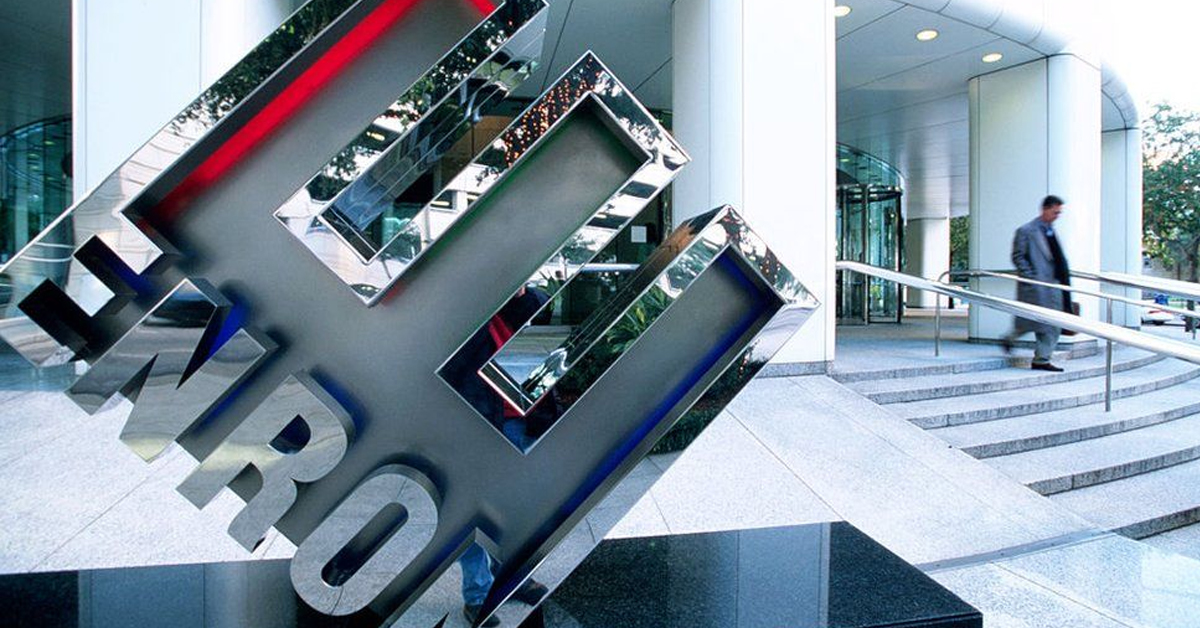The business world has witnessed a lot of success, failures, and stories. But at the turn of the 21st century, the Enron scandal, now considered the biggest scandal in history, truly rocked the financial industry and changed the business world forever. The scandal remained to be a great lesson for businesses all over the world in management, accounting, and especially ethical organizational culture.
A giant of innovation
Once considered a Wall Street Darling, Enron was an American energy company founded by Kenneth Lay in 1985 after the merger of Houston Natural Gas and InterNorth. Enron had maintained a good reputation in society and among its customers. It had an image of an innovative company that could do great things for its customers. It had built power plants, operated gas lines, and had unique trade businesses. Then it dealt in electricity, natural gas, communication, paper, and pulp.
What complicated Enron’s business structure — and differentiated it from larger peers like Exxon or Chevron — was the company’s involvement in the financial markets. Enron made extensive use of commodity derivatives to make money. However, larger businesses use derivatives primarily to reduce risk — or to hedge, in other words, to hedge against unwelcome changes in commodity prices.
Looming disaster
In 1999 — the middle of the dot-com bubble — the company created Enron Online, an electronic commodity & commodity derivatives trading website. Amazingly, Enron was the counterparty to every transaction made on Enron Online. In the initial years, trading volumes on Enron Online expanded exponentially; by mid-2000, Enron Online was on pace to execute $350 billion in trades per year. For context, Enron’s entire business had only about $60 billion in assets. It is not hard to see that Enron had overextended itself. When the dot-com bubble finally burst and Enron began to suffer from its significant exposure to the most volatile areas of the commodity market, the company’s executives began looking for ways to hide its tremendous losses.
To hide losses in its commodity business, CEO Jeffrey Skilling assigned Enron accountants to apply mark to market accounting to fixed assets, such as pipelines or oil refinery assets. Enron would transfer their assets to off-the-balance-sheet corporations, which would record the loss and avoid reporting declining profits at the Enron parent company. This allowed the company to write unrealized future gains from some trading contracts into current income statements, thus giving the illusion of higher current profits. Amid the mania of the dot-com bubble, Enron’s board of directors began investing significant sums of capital into broadband telecommunications equipment — expensive assets that never generated a dime of profit for the company’s shareholders. In one of the company’s last quarterly earnings releases before bankruptcy, its fledgling telecommunications segment reported an operating loss of $137 million.
Here came the downfall
In 2001, everything began to fall apart for Enron executives and shareholders. The stock price of the company plummeted from a high of $90 per share in mid-2000 to less than $1 by the end of November 2001, taking with it the value of Enron employees’ 401(k) pensions, which were mainly tied to the company stock. The SEC (Securities and Exchange Commissions) began an investigation and dug into the details of Enron’s publicly released financial statements. On December 2, 2001, Enron filed for Chapter 11 bankruptcy protection. Many Enron executives were indicted on a variety of charges and were later sentenced to prison. Enron’s $63.4 billion in assets made it the largest corporate bankruptcy in U.S. history.

What went wrong at Enron
In Enron’s case, its corporate culture played an important role in its collapse. It was a culture of greed and money making — In Enron, greed was good and money was God. They had spoiled the culture to shift the focus towards money and financial benefits. The entire company’s only focus was financial gain, and managers advised everyone to do everything that led to the company generating more money. Organisational culture supported unethical practises — corruption, cheating, and fake practices were widespread. Many executives and managers knew that the company was following some illegal and unethical practices, but the executives and the board of directors did not know how to make the ethical decisions and corporate ethical culture. Thus the company fell back and managers had to pay in the form of fines and imprisonment.
However, these were just the suffice factors. Heavy focus on performance led to negative use of competition as a whip to herd the employees in the wrong direction. Skilling was the company’s CEO, and he used a rank and yank system to goad the employees and managers. The result of this system was that it always pushed the bottom 20% of the underperformers out of the company. It made the employees compete against each other fiercely, giving rise to an environment of total distrust inside the environment.
>>> Read more: The biggest mistakes bosses will make with workers returning after Covid-19
Moral of the story
What came out of the Enron Scandal for the business world is the lesson on the importance of ethical organizational culture. It was the lack of ethics and integrity that led Enron to its dismay. When it comes to culture, leadership plays a critical role in shaping organizational behavior. People are constantly affected by the environment they are in. Therefore, if they are constantly in a toxic and money-hungry environment, they will easily be submitted to one.
Ethics is what keeps people in line from doing what is selfishly beneficial. It forces each and everyone to take a step back before carrying out any action whatsoever that may harm others. Without ethics, people no matter how good or pure, will be lured by the blinding sense of greed that money and materialism offers. An ethical organizational culture is not only necessary for the health and growth of a company, but it is also an indispensable part of society. And it is up to the leaders, the ones that the employees are looking up to as an example and an inspiration, to build and sustain an ethical organizational culture.
>>> Read more: What can entrepreneurs learn from this pandemic? Take a look at nature.
The JobHopin Team
Bibliography:
Pratap, Abhijeet. “What Was the Role of the Corporate Culture of Enron in the Scandal?” Notesmatic, 12 Mar. 2021, https://notesmatic.com/corporate-culture-enron-bred-scandal/
“Enron Scandal.” Encyclopædia Britannica, Encyclopædia Britannica, Inc., www.britannica.com/event/Enron-scandal.
“The Organisational Culture At Enron Corporation Commerce Essay.” ukessays.com. 11 2018. UKEssays. 06 2021 <https://www.ukessays.com/essays/commerce/the-organisational-culture-at-enron-corporation-commerce-essay.php?vref=1>.
“5 Actionable Lessons from the Enron Scandal.” Sure Dividend, 22 Aug. 2019, www.suredividend.com/actionable-lessons-enron-scandal/.

